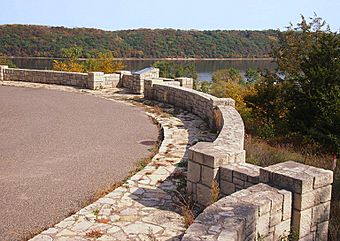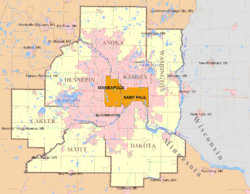Stillwater Overlook facts for kids
Quick facts for kids |
|
|
Stillwater Overlook
|
|

Stillwater Overlook and the St. Croix River
|
|
| Location | Lookout Trail near 63rd St. N., Oak Park Heights, Minnesota |
|---|---|
| Area | 4.8 acres (1.9 ha) |
| Built | 1938–9 |
| Built by | National Youth Administration, Minnesota Highway Department |
| Architect | Arthur R. Nichols, Harold E. Olsen |
| Architectural style | National Park Service Rustic |
| MPS | Federal Relief Construction in Minnesota MPS |
| NRHP reference No. | 07001318 |
| Added to NRHP | December 27, 2007 |
The Stillwater Overlook is a special spot in Oak Park Heights, Minnesota. It's a place where you can look out and see amazing views, especially of the St. Croix River valley. This overlook is just south of the city of Stillwater. It's found near where two main roads meet: Minnesota State Highway 36 and Minnesota State Highway 95.
This overlook is very important because of its history and design. In 2007, it was added to the National Register of Historic Places. This means it's a special site recognized for its importance to the state. It shows how early roadside rest areas were built in Minnesota. It also features a cool building style called "National Park Service Rustic." A talented landscape architect named Arthur R. Nichols helped design it.
Contents
What is the Stillwater Overlook?
The main part of the Stillwater Overlook is a strong wall made of stone. This wall gives you a perfect view of the beautiful St. Croix River valley. Imagine standing there, looking out over the water and trees!
How the Overlook Was Built
The stone wall was built a long time ago, between 1936 and 1937. It was constructed by a group called the National Youth Administration (NYA). This group helped young people find jobs during a tough time in history.
The stones used for the wall are very special. They are made of limestone and came from an old prison. This prison, called the Minnesota Territorial Prison, was taken down by the NYA starting in 1936. Reusing these materials was a smart way to build.
The National Park Service Rustic Style
The way the overlook was built is a great example of the "National Park Service Rustic" style. This building style focuses on using materials found right in the local area. For the Stillwater Overlook, that meant using local limestone.
This style also meant a lot of hand-on work. Many people were needed to build it. This was important during the Great Depression, a time when many people needed jobs. Government projects like this helped many families. The Stillwater Overlook is still in great shape today, looking much like it did when it was first built.
Stillwater Area Roadside Projects
The Stillwater Overlook was one of several projects built in the Stillwater area. These projects were designed to make roadsides more appealing and useful for travelers. They were part of a bigger effort during the Great Depression to create jobs.
Who Designed and Built Them?
Arthur R. Nichols, a landscape architect for the Minnesota Highway Department, designed these projects. A landscape architect plans outdoor spaces, making them beautiful and functional. The projects were built through special programs that helped people find work during the Depression.
Other Projects in the Area
Besides the Stillwater Overlook, other projects in the area included:
- An overlook located north of Stillwater.
- A parking area along the road at the St. Croix Boom Site.
- A historical marker about an important Native American battleground.
These projects showed how important the Stillwater area was for tourists. People loved to visit the area, and these new roadside spots made their trips even better.




